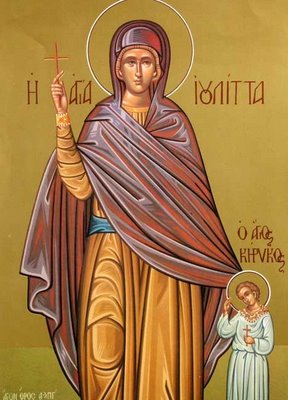
JULY 30 was the traditional memorial of ST. JULITTA (+c. 303/4).
Julitta was a rich lady who
May my estate be ruined or given to strangers; may I lose my life, and may my body be cut to pieces, rather than that by the least impious word I should offend God that made me.
Julitta was a large landowner from Iconium, a town in present-day Turkey. She was a widow and the mother of a three-year old, Cyricus. Around 303, Emperor Diocletian declared Christians infamous and barred from all protection of laws and from all privileges of citizens. Feeling unsafe, Julitta, her servants and her son, moved the 215 miles to Cappadocia, in Caesarea.
The story varies at this point, but there was a man who wanted to take her property. He sued for it and she fought back in court. To practically guarantee his suit, the man charged her with being a Christian, which, of course, she was. Julitta, with her little boy, appeared in court. The judge called for fire and incense to be brought in to the courtroom. Taking the little boy in his arms, the judge then ordered Julitta to sacrifice to the gods. Being a strong, practicing Christian, Julitta refused. This angered the judge and he informed her that the usurper would get all her belongings. Her response has come down to us: “May my estate be ruined or given to strangers; may I lose my life, and may my body be cut to pieces, rather than that by the least impious word I should offend God that made me.” She also reiterated that she was a Christian. At that point, the little child mimicked his mother, saying the same thing. The judge, furious, threw the little boy to the stone stairs, cracking his skull.
Julitta remained calm. She actually celebrated the fact that her child had been accorded the privilege of being martyred for the Faith. According to various stories, she was tortured, beheaded and/or burned at a stake. At any rate, the remains of mother and child were thrown into a heap of dead bodies.
Apparently, certain holy people followed these scenes and rescued the two bodies.
Not many years later, the stories circulated throughout the Middle East. During the time of Emperor Constantine, who died only 13 years later, their relics were rescued and buried in a monastery established in their names. The bishop of Auxerre, later in the same century, brought relics to France
St. Cyricus and his mother, St. Julitta, are honored in the Balkans as well as western Europe. The town of St. Cyr-sur-Mer, France is named after this child. The Cathedral of Never, France is dedicated to this mother-child duo of martyrs. St. Julitta has churches named after her in England.
The old memorial date has been changed, in recent years, to June 16, or July 15, in the Eastern Orthodox Church.

Recommended for ages 7-12

Recent Comments